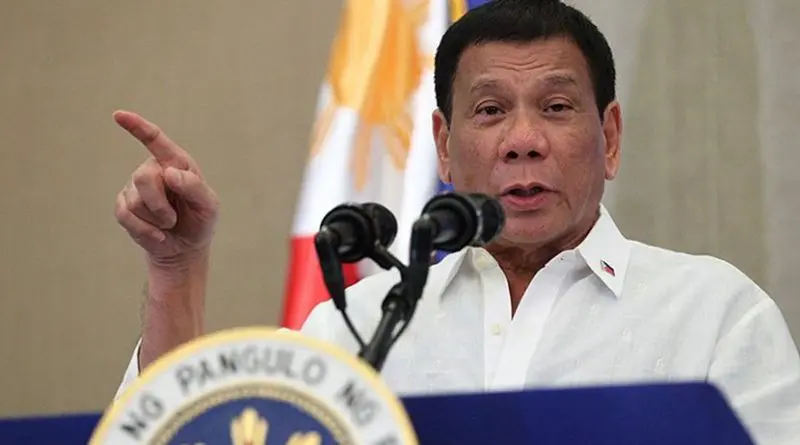Philippine Rights Body Joins Protests Over Media Crackdown
By BenarNews
By Karl Romano
The independent Philippine Commission on Human Rights (CHR) on Thursday joined protests against President Rodrigo Duterte’s perceived media crackdown through a government order to shut down the Rappler news website, saying attempts to muzzle a free press must be resisted.
A functioning democracy needs freedoms of information, speech and expression to function, said the commission, which receives government funding but has frequently assailed the Duterte administration over its deadly war against illegal drugs.
“When there are attempts to curtail it, it is equally important to protect press freedom,” CHR said in a statement, pointing out that print and broadcast media have “been very effective avenues” for individuals to express their right to give or receive opinions.
“In the end, press freedom can only be attained if media organizations remain free from any political or economic intervention,” CHR said.
The commission came out with the statement three days after the Philippine Securities and Exchange Commission (SEC) ordered Rappler closed, pending an appeal over allegations that it is partly owned by foreigners, in violation of a constitutional provision calling for all media entities to be wholly owned by locals.
The SEC questioned Rappler’s decision to issue Philippine depository receipts (PDRs) to allow two U.S.-based groups to hold shares in the firm.
Rappler contends that issuing PDRs did not mean that the American groups were allowed to control its editorial policies. It argued that PDRs had been used by other Philippine news companies to raise funds.
Among those holding PDRs issued by Rappler are the U.S.-based Omidyar Network, owned by e-Bay founder Pierre Omidyar, and North Base Media, owned and founded by a group of journalists advocating a free and independent press.
In its statement, the rights commission also called on the government to allow the press to operate freely and to “exercise liberties crucial in performance of their social mandate.”
“They have been an effective watchdog against abuses and are instrumental in demanding accountability and transparency from public officials and institutions that are found to jeopardize the best interest of the people,” CHR said. “In this context, protecting press freedom means protecting the interest of the people.”
Duterte: Issue ‘not press freedom’
Meanwhile, Duterte doubled down on his government’s criticism of Rappler, one of only a handful of local news entities that has been reporting constantly about the president’s drug war.
Earlier this week, Duterte defended the order and called Rappler a “fake news” outlet.
“The issue here is not press freedom,” he said, arguing that Rappler was not allowed to have foreigners as part of its ownership structure.
If Rappler is successful in defending its claim that due process was denied, then something is “deeply concerning” regarding press freedom, CHR argued.
“However, if the ruling of the SEC is upheld, Rappler must face the consequences as provided by law,” it said.
The Philippines is a signatory to the International Covenant on Civil and Political Rights and should ensure that “everyone shall have the right to freedom of expression,” CHR added.
Rappler’s name also came up in an annual report published Thursday by New York-based Human Rights Watch.
In 2017, President Duterte “publicly vilified media outlets whose reporters have exposed police culpability in extrajudicial killings,” HRW said in the Philippine section of its “World Report 2018.”
Examples cited by the watchdog included his government’s threat to block the renewal of the broadcasting franchise of the ABS-CBN network and slap the Philippine Daily Inquirer with tax evasion charges.
In addition, HRW said, the Duterte administration “falsely accused the media platform Rappler of being U.S.-owned in an apparent effort to undermine its credibility.”
Increasing protests
Media organizations, led by the National Union of Journalists of the Philippines (NUJP) and the Foreign Correspondents Association of the Philippines, have joined international calls, including from foreign correspondents’ clubs in Hong Kong and Thailand, in denouncing the move against Rappler. NUJP is spearheading a protest planned for Friday in Quezon City, a northern Manila suburb.
Rappler’s closing comes as the Catholic Church, which also criticized Duterte over his war on drugs, said it had not been given a renewal of its franchise license to operate 54 radio stations under its Catholic Media Network (CMN).
It said it filed an application this month after its 25-year license expired in August. The church was seeking a renewal, but the House of Representatives, which grants the franchise, has not acted on it.
The radio stations are scattered across the archipelago, and the church is believed to have the widest reach among media outlets. The church said CMN-affiliated stations had helped disseminate crucial information especially during times of emergencies.
Felipe Villamor in Manila contributed to this report.

